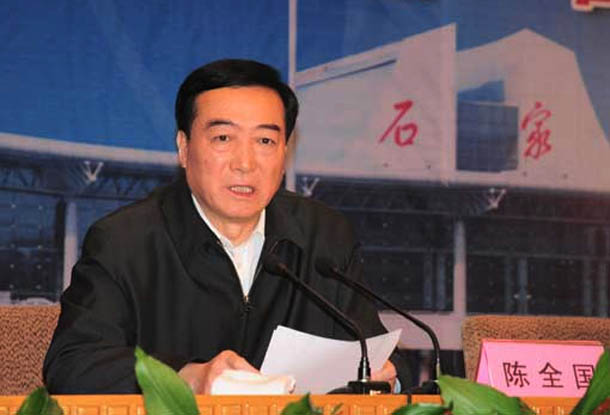
(TibetanReview.net, Dec13, 2016) – Party boss Chen Quanguo has been reported to be implementing in Xinjiang (East Turkestan) the policy of ironclad control with elements of economic rewards and an attitude of greater friendliness through a series of measures that he had introduced in Tibet Autonomous Region (TAR) during his previous posting there, reported the SCMP.com Dec 12. He is said to be seen as a success in the TAR, with his Xinjiang posting being considered a promotion, given the fact that it usually entails elevation to the Political Bureau of the Central Committee of the Communist Party of China.
The report noted that after assuming office in the TAR in 2012, Chen had ordered the recall of all ordinary passports held by residents. He was reported to have built in the regional capital Lhasa 156 “convenience police stations”, with the closest two being only 15 metres apart from each other. The report said these are one- or two-storey concrete structures stocked with wheelchairs, first aid kits, repair tools, umbrellas and even phone chargers for public use. However, they also come equipped with surveillance cameras and guards on 24-hour “seamless” patrols and could be quickly turned into checkpoints if needed.
The report also said that across the TAR, Chen had overseen the formation of 81,140 units of “double-linked households”, covering more than three million residents, ie, the TAR’s entire civilian population. This is a policy of mobilizing ordinary families to help with social and security control. Under the “double-linked household management system”, households are divided into groups of 10 to watch over each other for both security and poverty alleviation — hence the “double” in the description. The aim is stated to be to foster community supervision of potential security threats, religious extremism and “targeted individuals” on watch lists, as well as providing help and economic support.
The report cited official Chinese media as reporting that officials in Xinjiang were now actively looking to Tibet for lessons in social management. It said a team of Xinjiang officials had paid a week-long visit to Lhasa and Nyingchi (Tibetan: Nyingtri) in September to learn about their social management, including the double-linked household system.
The report cited James Leibold, an expert on China’s ethnic issues at La Trobe University in Australia, as saying that, by his count, Chen had pioneered at least six major policy initiatives aimed at maintaining stability in the TAR and was now bringing his methods to Xinjiang.
And following his transfer and posting in Xinjiang, Chen had, since October, required residents in many parts of the Xinjiang Uygur autonomous regionto hand over their passports to local police for safekeeping. Those wishing to travel abroad had to first seek permission from the authorities before reclaiming their passports, notices ordering the handover were cited as saying.
A sprawling net of “convenience police stations” were reported to have been built across cities and rural areas, with government websites and official media boasting of their opening. A website affiliated with the city government was cited as saying Urumqi alone, which had a built area of only 339 sq km, was expected to have 949 such stations. Many cities and counties were reported to have advertised for auxiliary police officers – often seeking to recruit hundreds at a time – to man those new stations.
A “double-linked household management system” was also reported to have gone into operation in a small village on the outskirts of Kashgar, the PRC’s westernmost city.
All these policies resemble those enacted in neighbouring TAR, where Chen ruled for five years before being appointed the party chief of Xinjiang at the end of August.
According to Leibold, increasing party-state security and control could be quite effective in the short term on a superficial level, pointing to the sharp decline in the number of self immolations and the absence of any major outbreaks of violence in the TAR in recent years. However, he has warned, deeper penetration of party-state control into the daily lives of residents in frontier regions could also instil resentment in some families and individuals.
“What happens when you bottle up resentment and sow the seeds of division in a rapidly changing society? Either people change their behaviour and adapt – I’m sure many people might – or sometimes they strike back, become more radicalised and lash out. Most of the acts of terror that have occurred in the past few years are acts of desperation. Some people have been pushed to extremes; these are their final acts,” Leibold was quoted as saying.
The report also cited Barry Sautman, an expert on Chinese ethnic politics at Hong Kong University of Science and Technology, as saying repressive measures were unlikely to end the ethnic conflict in Xinjiang, although other measures Chen was taking might have more effect.“There are some indications that he has not only these hard policies, but also some soft policies, mainly involving anti-poverty measures,” he has said, citing as an example Chen’s recent vow to eliminate poverty in Xinjiang by 2020 and raise income levels substantially.
In Sautman’s view, what China is doing in Xinjiang in nothing unusual. He has said the situation there should be viewed in the context of the international situation, where the typical approach of many governments to quell ethnic tension was some combination of hard and soft tactics.


